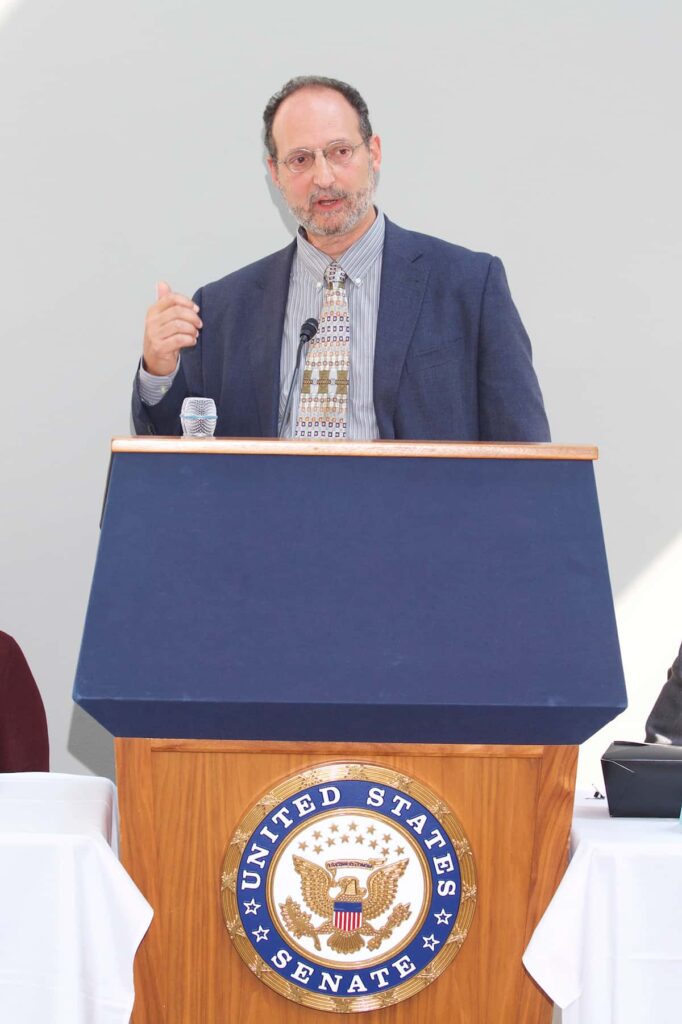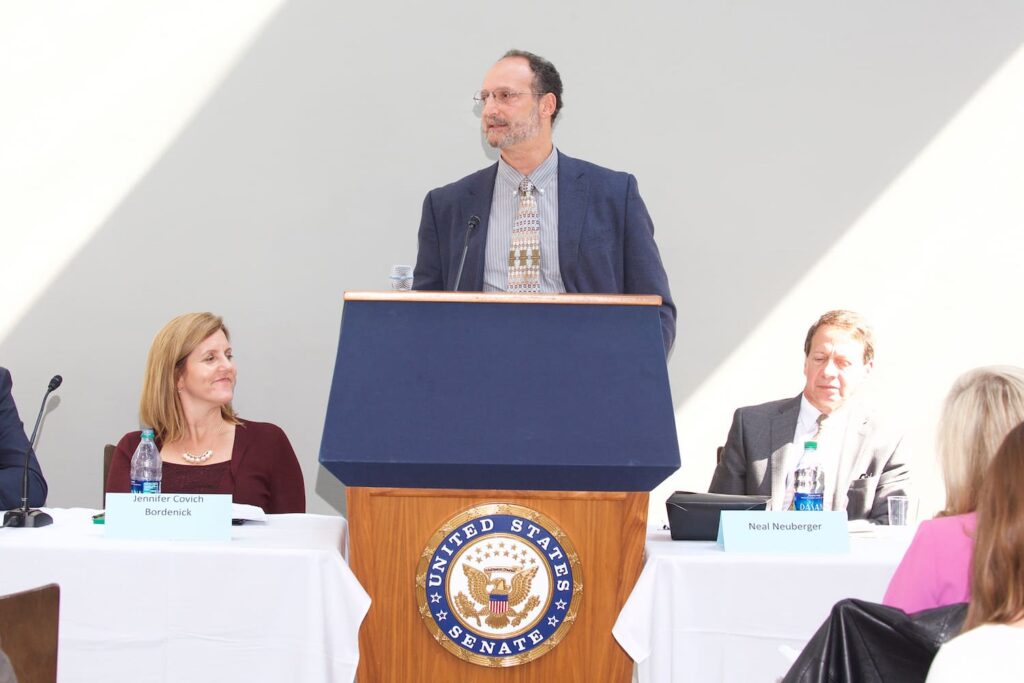Howard Rosen’s path to the healthcare industry is quite unique. He began his career in the entertainment field, producing films and television shows of various genres. However, in 2005, while working on a medical education film, Howard’s interest shifted towards the broader possibilities of technology in healthcare. This newfound passion led to the creation of LifeWIRE, a cloud-based communication platform aimed at improving health engagement. Over the years, Howard’s work in healthcare technology has earned him multiple patents (eight so far) and recognition, including being named a Rockefeller Foundation Top 100 Next Century Innovator. While Howard has been awarded several patents, he considers his most significant achievement to be promoting technology as an enabler, not a solution, in healthcare. For Howard, true success in healthcare comes from a human-centered approach where technology supports and enhances patient care. His focus has always been on humanizing digital transformation, putting patients at the core of digital initiatives, and creating meaningful healthcare experiences.
Over the years, Howard’s leadership style has evolved. Initially more focused on individual decision-making, he now values collaboration and openness. He strives to create an inclusive environment where team members feel empowered to share their perspectives. When decisions are needed, Howard is decisive and confident, ensuring the organization moves forward effectively. Leading in the healthcare technology space comes with its fair share of challenges, but Howard sees these as opportunities. He believes in involving his team to view challenges as opportunities for growth. For him, the key to overcoming challenges is to break them down into manageable parts and address the larger issues by working with them, rather than against them.
Howard has led various initiatives that significantly impacted patient care, particularly in overcoming hesitations around telehealth adoption. He and his team have implemented robust security measures to address privacy concerns and have run pilot programs to demonstrate the effectiveness of telehealth. They also provide training and ongoing support to both healthcare providers and patients, fostering trust and open communication. These efforts have highlighted the benefits of telehealth, such as improved access to care and reduced strain on healthcare facilities. Howard stays up-to-date with the latest healthcare trends by consuming a wide range of information, both online and offline, and not just within healthcare. He regularly follows industry news, participates in webinars, and leads programs that encourage creative thinking. Howard often refers to the statistic that 80% of innovation in any industry comes from outside that industry, a fact that influences his approach to staying informed and ahead of the curve.

“My vision for the future of healthcare is one where human-centered technology empowers healthcare professionals to deliver personalized, precise, and efficient care.”
For Howard, technology is a fundamental tool for improving healthcare services and outcomes. However, he emphasizes that technology should be used to enhance human interaction and care, not replace it. The human element is crucial in healthcare, and technology should serve to support and improve this human connection.
Howard believes that innovation is a mindset, not just about creating groundbreaking products or services. In his organization, innovation is encouraged through continuous learning, experimentation, and a relentless pursuit of excellence. Strategies to foster this culture include empowering curiosity, creating a safe space for sharing ideas and failures, prioritizing experimentation, celebrating small improvements, and promoting cross-functional collaboration. Through these efforts, Howard has built a culture where innovation thrives, and employees are encouraged to think creatively and continuously improve their work.
Howard Rosen believes that motivated and engaged employees are key to achieving organizational goals. To ensure his team stays motivated and aligned with the organization’s objectives, he focuses on several key strategies:
- Meaningful Involvement: Howard empowers his employees by involving them in the strategic direction of the organization, making them feel valued and integral to the company’s success.
- Transparent Communication: Open and transparent communication is a priority, ensuring that everyone in the organization understands the company’s vision, mission, and strategic priorities.
- Regular Feedback: Howard emphasizes the importance of regular feedback and recognition. By acknowledging his team’s efforts, he helps boost morale, improve performance, and reinforce positive behaviors.
- Opportunities for Growth: Investing in employees’ professional development is crucial. Howard provides training, mentorship, and career advancement opportunities, which keeps his team motivated and engaged.
- Celebrating Success: Whether it’s individual achievements or team milestones, Howard believes in celebrating success. This fosters a positive work environment and builds a sense of camaraderie and shared purpose.
For Howard, maintaining a patient-centered approach is fundamental. His leadership is guided by empathy, compassion, and a deep understanding of patient needs. To achieve this, he emphasizes human-centered design and actively involves patients, caregivers, and stakeholders throughout the development and implementation of healthcare solutions. Howard also empowers frontline staff to advocate for patient perspectives, ensuring that patient satisfaction and ethical considerations are always prioritized.
Howard recognizes that mental health is a critical aspect of overall well-being for both patients and healthcare professionals. For patients, mental health directly impacts their physical health outcomes, recovery from illness, and quality of life. For healthcare professionals, the demands of their work can lead to stress, burnout, and compassion fatigue, affecting their ability to provide high-quality care. Howard believes that prioritizing mental health is essential not only for the well-being of healthcare providers but also for ensuring patient safety and satisfaction.
“Innovation is a mindset that encourages continuous learning, experimentation, and a relentless pursuit of excellence.”

Howard is committed to making healthcare accessible and equitable for everyone, regardless of their background or abilities. His organization’s technology solutions are designed with these principles in mind. Recognizing that traditional healthcare technologies can be challenging or inaccessible for some patients, Howard focuses on meeting patients where they are, using familiar and accessible methods. His patented solutions empower patients to communicate with healthcare providers using the devices they are most comfortable with, breaking down barriers and ensuring that all patients can access the care they need.
Howard’s vision for the future of healthcare is one where human-centered technology empowers healthcare professionals to deliver personalized, precise, and efficient care. He sees artificial intelligence (AI) as a game-changer, capable of enhancing data access and supporting clinicians in making more informed decisions. To achieve this vision, Howard is dedicated to developing intelligent automation solutions that streamline administrative tasks, reduce clinician burnout, and allow healthcare professionals to focus on providing compassionate care. His ultimate goal is to bring healthcare closer to the era of precision medicine, where treatments are tailored to each individual patient’s needs. Howard invests in his team’s professional development by offering training, mentorship, and career advancement opportunities. He also makes it a point to celebrate both individual and team achievements, fostering a positive and supportive work environment. This approach not only motivates his team but also builds a sense of camaraderie and shared purpose, essential for continuous growth and success.
Advice for Aspiring Healthcare Leaders:
For those looking to make a difference in the healthcare industry, Howard offers the following advice
- Be Fearless: Don’t be afraid to challenge the status quo and explore new ideas. Innovation often comes from thinking outside the box.
- Listen and Learn: Seek insights from respected thought leaders, incorporate different perspectives, but ultimately trust your instincts.
- Focus on Impact: Leadership should be about making a positive impact on patients and the healthcare system. Stay focused on outcomes that matter most.
- Build Relationships: Cultivate strong relationships with colleagues, mentors, and stakeholders. Collaboration and teamwork are essential for driving change.
- Embrace Continuous Learning: The healthcare landscape is always evolving. Stay curious, keep learning, and adapt to new challenges and opportunities.
Howard often refers to a quote from Theodore Roosevelt’s speech at the Sorbonne in 1910, which embodies his philosophy:
“It is not the critic who counts; not the man who points out how the strong man stumbles or where the doer of deeds could have done better. The credit belongs to the man who is actually in the arena, whose face is marred by dust and sweat and blood; who strives valiantly, who errs, who comes short again and again, because there is no effort without error and shortcoming; but who does actually strive to do the deeds; who knows great enthusiasms, the great devotions; who spends himself in a worthy cause; who at the best knows in the end the triumph of high achievement, and who at the worst, if he fails, at least fails while daring greatly, so that his place shall never be with those cold and timid souls who neither know victory nor defeat.”
This quote resonates with Howard’s belief in the value of taking risks, striving for greatness, and making a meaningful difference in the healthcare industry.
“True success in healthcare requires a human-centered approach where technology is used to support and enhance patient care, not replace it.”


